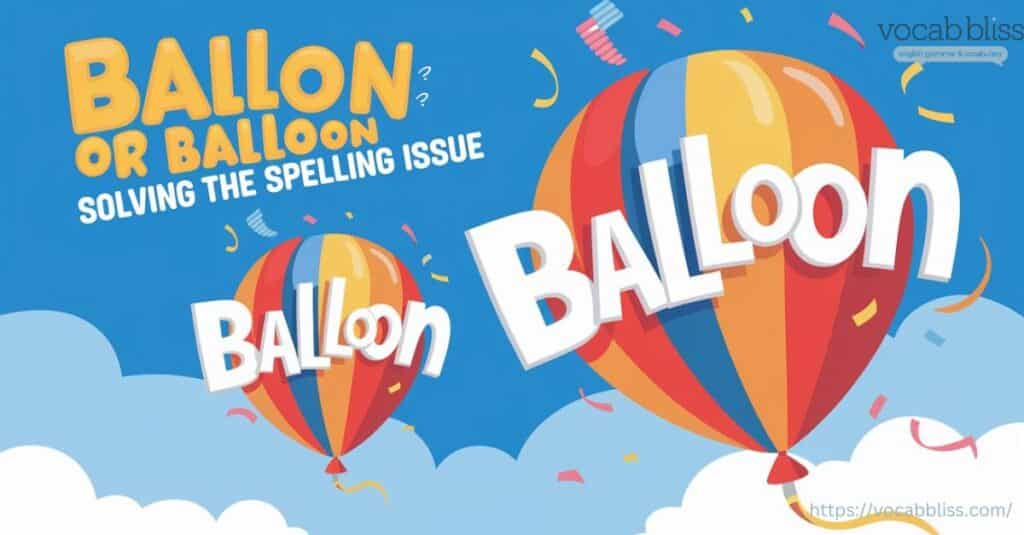Spelling errors can sneak into our writing, even with the best intentions. One such frequent mix-up is between “ballon or balloon.” This confusion stems from their visual similarity and shared linguistic roots. While “balloon” is a familiar word in English, used to describe inflatable objects or rapid expansion, “ballon” has its origins in French, where it refers to elegance in ballet movements or simply means “ball.”
The subtle difference—a single “o”—can drastically alter the meaning, leading to miscommunication or an unintended tone. Clarifying this distinction not only improves your writing but also enriches your vocabulary by distinguishing these seemingly similar terms.
Quick Summary
Understanding the difference between “ballon or balloon“ is essential to avoid common spelling mistakes. In English, “balloon” refers to inflatable objects or the act of expanding, while in French, “ballon” describes a dancer’s light, floating jumps in ballet. Both words have unique contexts, with “balloon” being a part of everyday language in celebrations, scientific applications, and idiomatic expressions, while “ballon” remains niche, tied to the art of dance. Knowing these distinctions can improve your vocabulary and prevent miscommunication, especially in specialized or creative writing.
Explore further: Appendices or Appendixes? Clarifying Usage
Understanding the Confusion: ballon or balloon
Many misspellings stem from similar pronunciations, rapid typing, or a lack of familiarity with the word’s roots. “Balloon” is widely used in English, while “ballon” often sneaks in as a typo or an incorrect assumption. However, the word ballon does exist—it has a specialized meaning in ballet terminology.
By understanding their definitions and contexts, you will equip yourself to use these words appropriately and confidently.
What Does Ballon Mean?
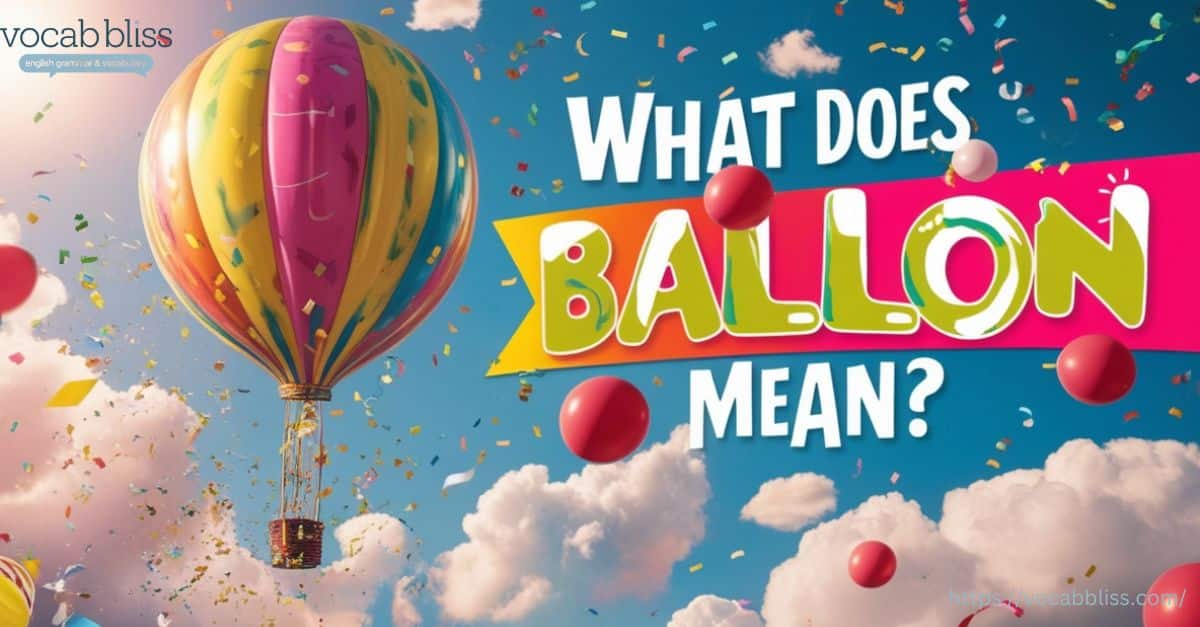
Definition and Origin
The term “ballon” originates from French, where it literally translates to “ball.” However, its usage extends beyond this simple definition. In the specialized world of ballet, “ballon” refers to the light, graceful quality of a dancer’s jump or leap, giving the impression of floating momentarily in the air.
The language of ballet integrates this term, with French terminology widely adopted regardless of the dancer’s native language. Dancers view the concept of “ballon” as a mark of exceptional skill, emphasizing their control, strength, and ability to create an illusion of weightlessness.
Despite its elegance, “ballon” is not a term that finds use in general English contexts. Its rarity outside ballet and performance arts often leads to it being misinterpreted or mistaken as a misspelling of “balloon.”
Examples in Context
To understand how “ballon” is used, let’s explore examples within its niche settings:
- In Ballet Critiques:
- “The dancer’s ballon was exceptional, making each leap appear effortless and weightless.”
- “Her ballon added a magical quality to her grand jeté, captivating the audience.”
- In Ballet Training:
- “Developing ballon requires strength, timing, and precise muscle control to create the illusion of floating.”
- “The instructor praised his ballon during practice, encouraging him to refine his landings.”
- Rare Historical Use:
- While primarily associated with ballet, “ballon” has occasionally appeared in older French texts or artistic critiques to describe a similar quality in performances.
These examples showcase how “ballon” is deeply tied to the art of dance, highlighting elegance and technical mastery. Furthermore, its use in everyday English is virtually nonexistent, reinforcing its unique association with ballet.
What Does Balloon Mean?
Definition and Modern Usage

The word “balloon” is a staple in the English language, primarily recognized as a lightweight inflatable object made from materials such as rubber, latex, or nylon. Balloons are often associated with celebrations, scientific exploration, and transportation. For example, they are used to decorate birthday parties, monitor weather conditions, and even carry passengers in hot air balloons.
However, “balloon” is not just a noun. It also serves as a verb, describing the act of swelling, expanding, or increasing rapidly, often metaphorically. For instance:
- The budget ballooned to twice its original size.
- His excitement ballooned as the event approached.
This dual nature—literal and metaphorical—makes “balloon” a versatile and widely used term in English.
Synonyms and Related Terms
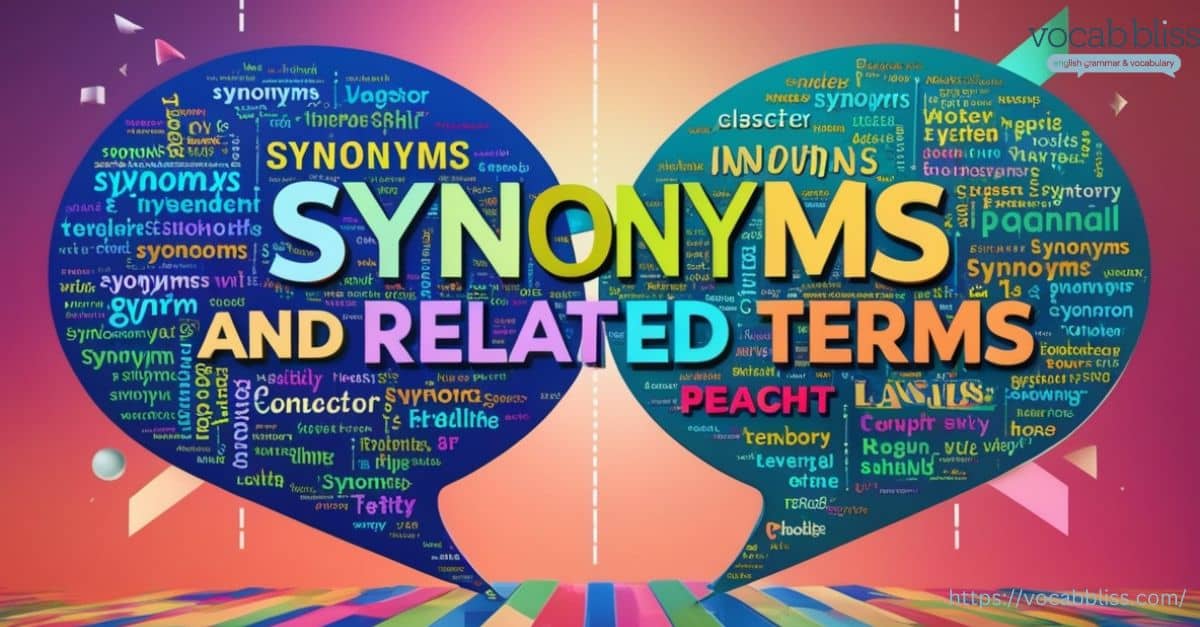
While “balloon” is the most common term, there are several synonyms and related words that fit different contexts. These include:
- Inflatable: A general term for objects that can be filled with air or gas.
- Blimp: A specific type of large balloon used in air travel or advertising.
- Sphere: Refers to the round shape of many balloons.
- Parachute: While distinct, it shares similarities in its inflatable structure.
- Bubble: Often used metaphorically, similar to “balloon.”
These synonyms expand the vocabulary surrounding balloons, offering alternatives in creative writing or specific situations.
Everyday Examples
Balloons play a prominent role in daily life, and their versatility is evident in the following contexts:
- Celebrations and Parties:
- The birthday party was adorned with colorful helium balloons.
- Children laughed as they let their balloons float into the sky.
- Scientific and Practical Use:
- Weather balloons help scientists collect atmospheric data.
- A hot air balloon ride offers stunning views of the countryside.
- Idiomatic Expressions:
- The company launched a “trial balloon” to gauge customer interest.
- Her hopes ballooned after receiving the good news.
- Creative Uses:
- Artists sometimes create intricate balloon sculptures for events.
- Balloons filled with confetti were popped during the celebration.
From festive decorations to advanced scientific tools, balloons bring functionality, joy, and symbolism to countless situations, making them an integral part of modern life.
Balloon vs Ballon: Side-by-Side Comparison
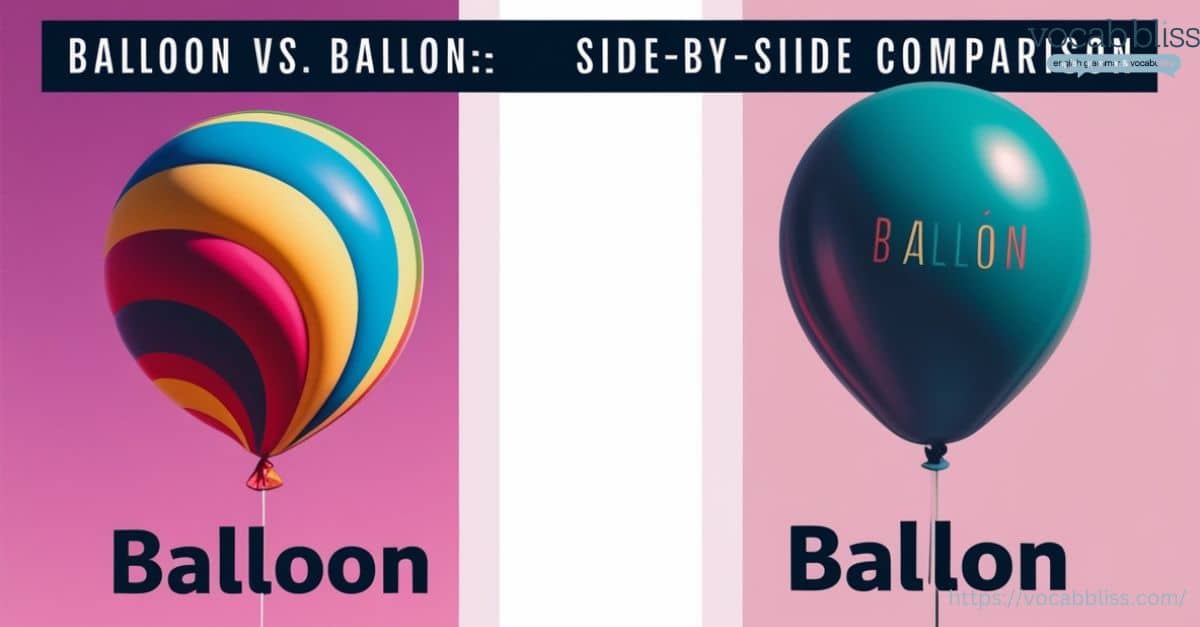
Understanding the key differences between Balloon or Ballon is essential. Here’s a quick reference:
| Aspect | Balloon | Ballon |
|---|---|---|
| Meaning | Inflatable object, or verb (to expand) | Graceful quality in ballet |
| Context | General English usage | Specialized (dance/ballet) |
| Pronunciation | bə-ˈlün | bä-ˈlōⁿ |
| Usage Examples | “Birthday balloon” | “Ballet dancer’s ballon” |
| Commonality | Extremely common | Rare in English |
By keeping this table handy, you’ll never mix ballon or balloon again.
Featured Misspellings and Common Errors
When writing, it’s easy to confuse similar-sounding words, especially when it comes to spelling. Mistakes such as “baloon”, “ballonn”, “balon or bollon” are common errors many people make. These misspellings arise from typographical mistakes, mishearing the word, or simply forgetting the correct letter placement. Let’s break down these misspellings and explain why they’re incorrect:
- “Baloon”: One of the most common mistakes is dropping one of the “o’s” in “balloon.” This often happens because the word “ballon” is mistakenly used as a shortcut. The correct spelling is “balloon”, which includes two “o’s.”
- “Ballonn”: Adding an extra “n” at the end of “balloon” is another frequent error. This happens when people incorrectly assume the word should end with double “n.” However, the correct spelling is “balloon”, with only one “n” at the end.
- “Balon”: Omitting both “o’s” creates “balon,” which may look like a phonetic version of the word, but it’s not the correct spelling. The proper form is “balloon,” which reflects the rounded, inflatable nature of the object.
- “Bollon”: A less common but still notable error, “bollon” occurs when an extra “l” is inserted, possibly due to confusion with similar words like “ball.” The correct spelling remains “balloon,” and this error is often found in rushed or informal writing.
These misspellings can cause confusion, especially in formal writing or when clarity is important. Using the right spelling not only enhances readability but also ensures that your audience understands the intended meaning.
Baloon
The misspelling “baloon” is a common error many make when writing the correct word, “balloon.” This mistake often occurs due to the doubling of the wrong letter, with only one “o” instead of two. Understanding the correct “balloon spelling” is crucial, especially in formal writing or contexts where clarity is key. Remember, “balloon” always features two “o’s,” reflecting its light and inflated nature, much like the object it describes.
Examples of Correct and Incorrect Usage
Let’s examine some common scenarios to reinforce the correct usage:
- Correct: The hot air balloon soared over the valley.
- Incorrect: The hot air ballon soared over the valley.
- Correct: The dancer’s ballon was extraordinary.
- Incorrect: The dancer’s balloon was extraordinary.
These examples underline the importance of context in choosing the right word.
FAQs
Why do people confuse “ballon or balloon“?
This confusion occurs because “ballon” looks like a plausible spelling for “balloon.” Additionally, the word “ballon” is rarely encountered, making it easier to mistake it for a typo.
Is “ballon” ever correct in English?
Yes, but only in specific contexts such as ballet terminology. For general use, “balloon” is correct.
How can I avoid this error in writing?
- Use a spell-check tool for instant corrections.
- Familiarize yourself with the specific meanings of both terms.
- Remember: Balloons inflate; ballon relates to dance.
Conclusion ballon or balloon
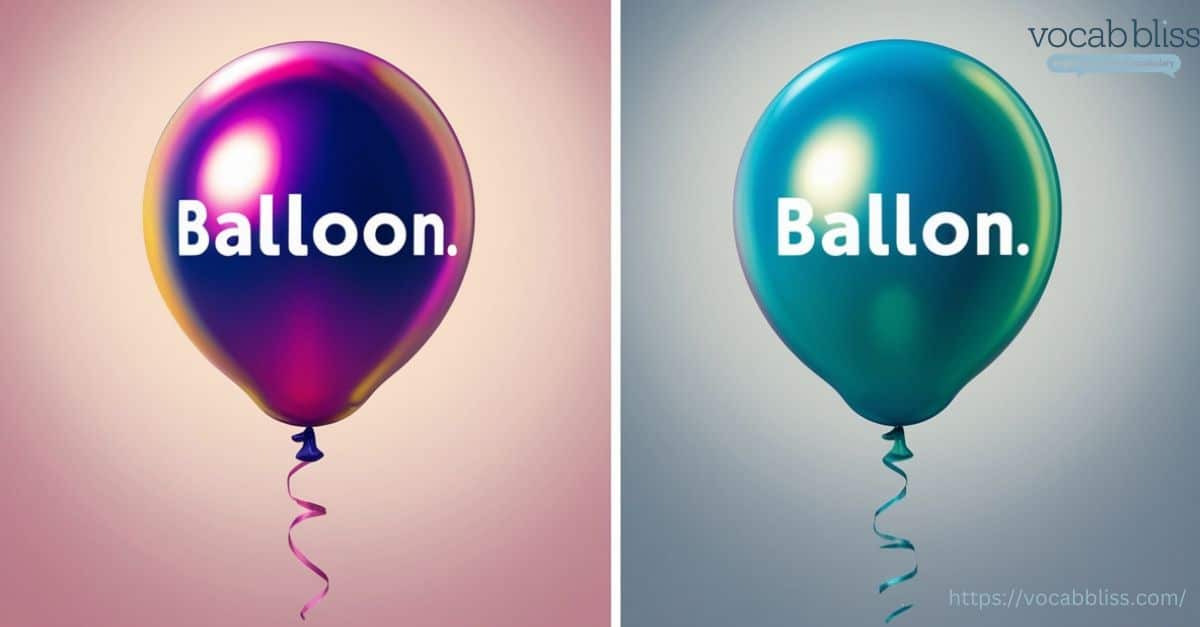
Understanding the distinction between “balloon or ballon” is vital for clear communication. While balloon dominates everyday language, ballon serves a specialized purpose in the world of ballet. By mastering these nuances, you’ll not only improve your spelling but also your grasp of English vocabulary.
Whenever you’re in doubt, think about context. Is it about inflatables, celebrations, or growth? Then it’s balloon. If it’s about elegance in dance, it’s ballon.
Dive Deeper:
- Busses or Buses: Clarifying the Plural Form of “Bus”
- Lier or Liar: Picking the Right Word
- skillset or skill set, Skill-Set,: Which is Right?
- Kart vs Cart: Appropriate Use and Context

Jorge Phillips is an experienced blogger who writes for Vocab Bliss, sharing his passion for the English language. With a knack for simplifying complex grammar rules and a focus on commonly confused words, Jorge helps readers navigate the nuances of English with ease. His insights aim to make learning engaging and practical.

